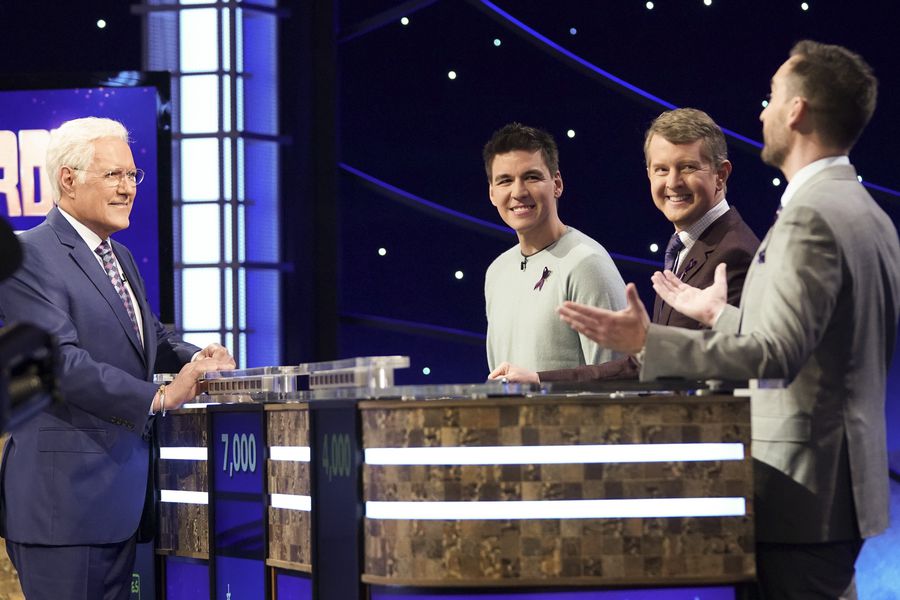PASADENA, Cal. – These are the “Jeopardy” giants, the guys bringing new life to an old game.
They are the three all-time top winners, locked in a primetime competition, plus host Alex Trebek. They bring smarts, strategy … and silliness. “I love silliness,” Trebek insists.
Brad Rutter (shown at right) – battling Ken Jennings (center) and James Holzhauer (left) in the ABC tournament – recalls the time he and two other contestants whimsically decided to stand behind the podium without their pants.
“We all had a good laugh,” Rutter said. “And then (announcer) Johnny Gilbert said, ‘And now the host of “Jeopardy,” Alex Trebek.’ And Alex came out with no pants on.”
Trebek had overheard their plan. “He’s like Santa Claus,” Jennings said. “He hears everything.”
But he doesn’t know everything. Preparing for one show, Trebek saw “when the Aztecs spoke Welsh,” one of the hardest categories ever. “I’m making diacritical marks, to help me pronounce those words correctly. And then … we’re about to tape this one and I said, ‘What happened to the Aztecs speaking Welsh?’ And (producers) said, ‘Have you looked at your watch or your calendar? It’s April 1st.’”
That sense of fun was clear as the swapped stories at a Television Critics Association session.
Rutter told how the show remade his life when he was “22 years old and working at a CD store, if you remember those.” He found fame and even hosted a regional show back home in Pennsylvania.
Holzhauer was asked if his success had led to new things. Well … “I just got an email yesterday from a young lady in Indiana who would like me to play a game of Monopoly at her house.”
Later that day, Jennings chatted casually with TV critics, posed for pictures and offered memories.
There was the question that doomed him, after 74 wins: Which company employs most of its 70,000 white-collar workers only four months a year? He guessed FedEx; the answer was H&R Block.
“Afterward, both H&R Block and FedEx contacted me about doing something,” he said. He didn’t, but admired the suggestion of an ad saying: “The only time that Fed-Ex was the wrong answer.”
Or the time he and Rutter were down to the final question – the only secretaries of state, 160 years apart, who never married. Both knew James Buchanan, but Rutter correctly said Condoleezza Rice; Jennings said Madeleine Albright. “That was a million dollars,” involving one person’s marital status.
For years, those two were the lone giants – not enough for a primetime battle. “There was never a third candidate,” Trebek said. Then came Holzhauer. “All of a sudden, hey, this is great television.”
Holzhauer, a professional gambler, brought his gunslinger philosophy: Start at the highest money level and work down; if you get a “daily double,” bet to the max.
Jennings prefers what he calls a “lower-risk” style; Holzhauer helpfully suggested the word “wimpy.”
And now it’s the Holzhauer approach that prevails. “Once somebody breaks the glass on doubling up, you gotta do it as well,” Jennings said.
And yes, they want that chance; that’s why they often start with middle-money totals. “The middle of the board is where the Daily Doubles are,” Rutter said.
Then there’s the strategy of when to buzz. “Most of the time, all three of us know the answer,” Rutter said. So buzzer timing is “probably the most underrated part of success.”
Someone who buzzes before Trebek finishes the question is frozen out. Jennings often hits it right.
“I’m used to just being able to find that sweet spot,” he said, “because I’ve been listening to Alex’s voice my whole life. Then I play with these two and the sweet spot is like a millisecond wide.”
But what about certain questions – wordplay, numbers and such – that require mental gymnastics?
“You don’t have time to figure it out,” Holzhauer said. But you buzz anyway, figuring, “OK, I can get the rest of it maybe in the five seconds I have.”
It’s a calculated risk, Jennings said. “There’s a weird thing the brain can do, where you’ll look at a mass of words as you hear Alex’s voice and you’re like, ‘Somewhere in me, I have this fact.’”
Sometimes that fails; often it succeeds, which is what makes them the “Jeopardy” giants.
– “Jeopardy: The Greatest of All Time,” 8 p.m., ABC; continues until someone wins three nights
– Jennings won on Tuesday and Thursday, Holzhauer on Wednesday. Now it returns Tuesday; (Jan. 14); it could wrap up then … or could stretch on to Wednesday, Thursday and even Friday
